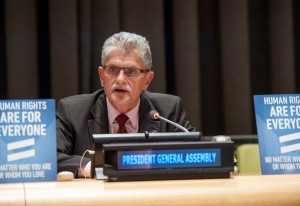Opening remarks by H.E. Mr Mogens Lykketoft, President of the 70th session of the General Assembly, at the Economic Cost of LGBT Exclusion
10 December 2015
Mr Secretary General, Excellencies, ladies and gentlemen, I am delighted to join you for this important event.
Let me begin by thanking the LGBT Core Group for once again bringing into focus the issue of discrimination against members of the lesbian, gay, bisexual and transgender (LGBT) community.
As you know, not all members of the General Assembly, see eye to eye when it comes to questions of sexual orientation and gender identity and we remain cognisant of this fact.
At the same time, no member state can deny that it is legally bound to ensure that all people enjoy their human rights without discrimination – and this includes discrimination against those who are lesbian, gay, bisexual and transgender.
Regrettably, we still have a long way to go before LGBT people are treated as equal citizens, able to live their lives free from fear or harassment; free to contribute to their society like any other person.
Studies and surveys show that LGBT youth are far more likely than their peers to be bullied and forced to skip or even drop out of school.
That they are also far more likely to be rejected by their own families and end up on the streets.
And that their lives are often blighted by hate crimes, discrimination and stigma.
In 76 countries, for example, LGBT people – and especially gay men – live with the very real fear of being arrested, prosecuted and imprisoned simply for loving someone of the same sex.
We know what States need to do to change this reality and address these abuses:
Repeal laws that criminalize people for being gay and transgender;
Put in place anti-discrimination laws that penalize anyone who discriminates against people because of their sexual orientation and gender identity;
And educate people – starting in schools – to respect one another, no matter the differences that distinguish us one from another.
Taking steps such as these will enable member states to enrich people’s lives. It will see them fulfil their international human rights obligations and, as we will hear today, help them to reap significant economic dividends.
As is the case with discrimination against women, or racial minorities, or migrants or other disadvantaged groups; discrimination against LGBT people leads to exclusion, a waste of human potential, a loss of creative talent, and a loss of productive capacity. Ultimately, it undermines our 2030 Agenda and the sustainable development goals elaborated therein.
According to research commissioned by the World Bank, the drag on a country’s economic growth caused by LGBT exclusion can amount to billions of dollars in lost GDP whereas promoting greater LGBT inclusion promises to bring real and substantial economic benefits.
I understand the lead researcher involved in that work, Dr. Lee Badgett, is with us today and I look forward to hearing her presentation.
Thankfully many people are more than aware of the economic and social benefits of LGBT inclusion and I am greatly encouraged by the example set by some of the world’s leading companies in this respect.
I look forward to seeing this coalition – of committed Governments, companies and civil society – continue to strengthen and expand in the coming years.
In concluding, I encourage all of us to go beyond our comfort zones; to reach out to those with different perspectives and views; and to engage with them in a respectful conversation on the benefits and legal obligations involved in bringing about full LGBT inclusion.
I thank you for your attention.


